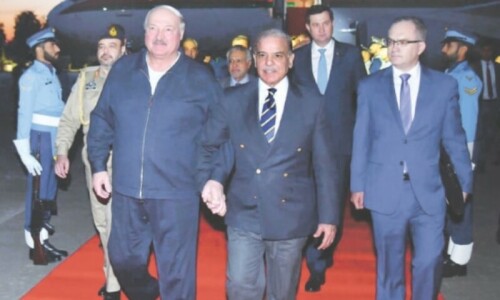KARACHI: Calling the last PTI-led government’s economic policies ‘landmines’ for the new administration of Prime Minister Shehbaz Sharif, Finance Minister Miftah Ismail vowed on Thursday to maintain petrol prices at their current level, without imposing any new tax or levy on petroleum products.
He also hinted at a targeted subsidy for the poorer segments of society and lower income groups that would not benefit the ‘financially stable class’, but didn’t share any details about the proposed plan.
Speaking at a press conference at the PML-N Karachi office, the finance minister shared sketchy details of his plan about the future ranging from his recent talks with IMF officials to meetings in Saudi Arabia and “blunders” of the past rules to structure of competitive economy.
“I have shared this fact before and mentioning here again that the government is currently accruing a loss of Rs30 per litre on petrol. The government is losing Rs70 per litre on diesel.
“Ultimately, the burden of all these subsidies is placed on the exchequer. If the current oil prices are maintained for May and no decision is taken to increase them, the government would be losing Rs102 billion. But we are trying our level best to keep them maintained,” he added.
Flanked by PML-N leaders Nasiruddin Mahmood and Ali Akbar Gujjar, the finance minister blamed the PTI for the “deliberate measures” which it made after sensing the fall of its government just to create challenges for its successors. The situation had finally started denting the national economy, but it was “controlled measures” of the new coalition government which had managed to “keep things under control”, he claimed.
Accusing Imran Khan of using the PM Office to facilitate his “real estate friends”, Mr Ismail said the former premier had directly contacted the IMF chief for allowing amnesty for realtors and those associated with the construction industry to “favour his few close aides”.
“Here I share with full authority and responsibility that he [Imran Khan] directly made a phone call to the IMF managing director and asked her to allow one last amnesty for the real estate sector, telling her that he has some very close friends which are associated with this sector,” he added.
“After showing resistance earlier, finally the IMF allowed that exemption. He [Imran Khan] didn’t ask for any tax exemption on medicine or pharma sector. He didn’t plead the case for milk powder. But, yes, he was worried for his real estate friends and finally won them the subsidy. You may all know that who after that exemption from the IMF made huge money,” Mr Ismail said.
In another ‘landmine’ for the incumbent government, he said, the PTI administration had in its final days notified another amnesty scheme which allowed investors to set up industrial units with a year-long tax exemption.
“This decision was made when they were convinced that the government is about to fall anytime. They didn’t even bother to get a nod from the IMF and notified an amnesty on their own which facilitates investors that if they want to set up any factory they won’t be asked about their capital and then they would enjoy tax exemption till December 2022. What should I call it? Isn’t it a landmine?”
When asked about his recent foreign visits and busy last few weeks in which he had meetings with IMF and Saudi Arabia officials, the finance minister said the exercise was to stabilise the economy before its development and for that particular objective he had put a few proposals before different sources.
“In a bid to strengthen the country’s economy and foreign reserves, we have requested Saudi Arabia not to withdraw its deposits worth $3 billion in the State Bank of Pakistan until the end of this year. “Unfortunately, the previous government had badly misguided the people of Pakistan on talks with the IMF. We have tried to clear things up. An IMF delegation is expected to visit later this month. The previous administration had made huge mistakes.
“The untargeted subsidies and tax amnesty schemes for real estate and industrial sectors have increased government borrowings and crowded out. The banks are left with nothing to give anything to the private sector after lending so much money to the government,” Mr Ismail explained.
Published in Dawn, May 6th, 2022










































Dear visitor, the comments section is undergoing an overhaul and will return soon.